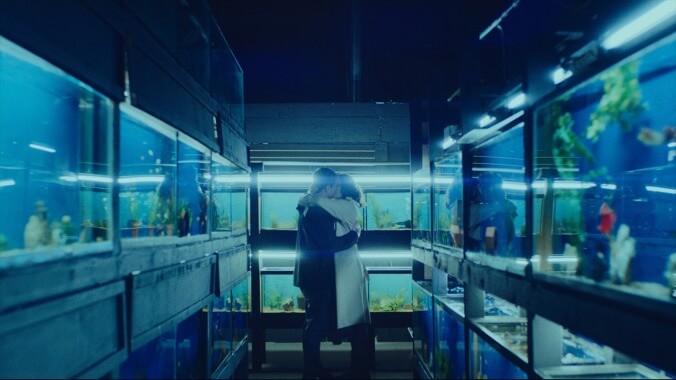A timely pandemic tests one couple’s love in the otherwise forgettable Little Fish

Note: The writer of this review watched Little Fish on a digital screener from home. Before making the decision to see it—or any other film—in a movie theater, please consider the health risks involved. Here’s an interview on the matter with scientific experts.
While everyone not currently a billionaire can agree that the COVID-19 pandemic has been a great misfortune for the planet Earth, it’s also been an unexpected boon for the sci-fi-inflected indie romance Little Fish. Produced in the pre-crisis world of 2019, Chad Hartigan’s latest film seemed destined for a low profile, from a premiere at last year’s Tribeca Film Festival to an undoubtedly quiet release somewhere down the line. But even though the quarantine scuttled that debut, it also left the script with a resonance no one involved could have possibly hoped for. The story of Emma (Olivia Cooke) and Jude (Jack O’Connell), a couple fighting to survive a virus decimating the world’s population, has become an unwitting document of its era.
The apparent bad news is that pop culture can capture the zeitgeist of a once-in-a-century moment down to the most eerie, specific details without being particularly interesting. Emma and Jude fight through the ravages of NIA— that’s a Neuro-Inflammatory Affliction, pretty much a spontaneous rapid-onset Alzheimer’s—with an agony that must be familiar to the innumerable families coping with the abrupt endangerment or loss of their loved ones. But aside from the scant flourishes of world-building meant to enrich their corner of Seattle, there’s nothing special about their union, or its painful dissolution. Considered outside of its real-world metacontext, it’s just another dying-spouse weepie without much to justify our emotional investment. In this respect, the relevance starts to work against the characters; people are dying by the hundreds and thousands, and we’re supposed to muster up some tears for two imaginary characters with all the charm of telephone poles?
Everything about the bond between Emma and Jude feels crafted in a conscious and calculating way, as if they’re corresponding pieces of an equation rather than actual human beings. She’s a veterinarian at a kill shelter, tasked with the miserable work of updating the whiteboards that count down the days each dog has left and making their remaining time as painless as possible. He’s a photographer, trying in vain to freeze precious moments in time. Just as their early flirty exchanges interlock as only movie dialogue can, their jobs correspond too tidily to the labor they will have to do for each other once the reality of NIA encroaches on the bubble they’ve built for themselves. The sickness surrounds them at a lifelike gradual pace, first claiming a bus driver who stands up and walks out of the vehicle mid-route, and then from strangers to friends.
Jude and Emma get a front-row seat to the sadness awaiting them as their closest couple-pals, Ben (Raul Castillo) and Samantha (French singer Soko), go through the same thing. Once a warm guy, Ben turns into an irritable shell of himself, even breaking out in violence when Samantha comes home at the end of a workday and he mistakes her for some random lady breaking into his house. Like everything else in this film, they’re calibrated to be accessories to the real protagonists, a motivating device without much interiority to speak of. They compel Jude and Emma to vow that they will do anything to avoid that outcome, from risky experimental trials to a ghastly home procedure akin to a DIY lobotomy, and then vanish. Their awkward reappearance further down the timeline only serves to re-emphasize how expendable they always were.
The bulk of the film stays with Emma as she comes to grips with how little she can do to save her husband from slipping into a fog of memory. Screenwriter Mattson Tomlin (the pen behind Netflix’s recent Project Power, another attempt to revitalize played-out genre tropes with a supernatural hook) goes for Amour’s heart-crushing death in slow motion, yet lands somewhere closer to the Instagram-filtered angst of Drake Doremus. (Hartigan’s fondness for lens flares only clinches the comparison.) Despite the dystopia lurking around the fringes of Emma and Jude’s life together—a single truther denounces NIA as a government psyop, a prediction that turned out to be a naïve underestimation —this looks no different than any of the other movies about good-looking people saying goodbye.
In times of great crisis, we have no choice but to steel ourselves a bit for preservation’s sake; otherwise we’d spend all day wracked with grief for people we do not know. The lackluster Little Fish banks on the automatic pathos of its subject matter, unaware that such delicate material actually requires greater skill and finesse to pull off, now more than ever. Rather than imbuing this unintended commentary with a cathartic charge, its proximity to reality accentuates the air of inauthenticity. It’s like the old saying about history repeating itself goes: first as tragedy, then as an over-glossed insult to Eternal Sunshine Of The Spotless Mind.